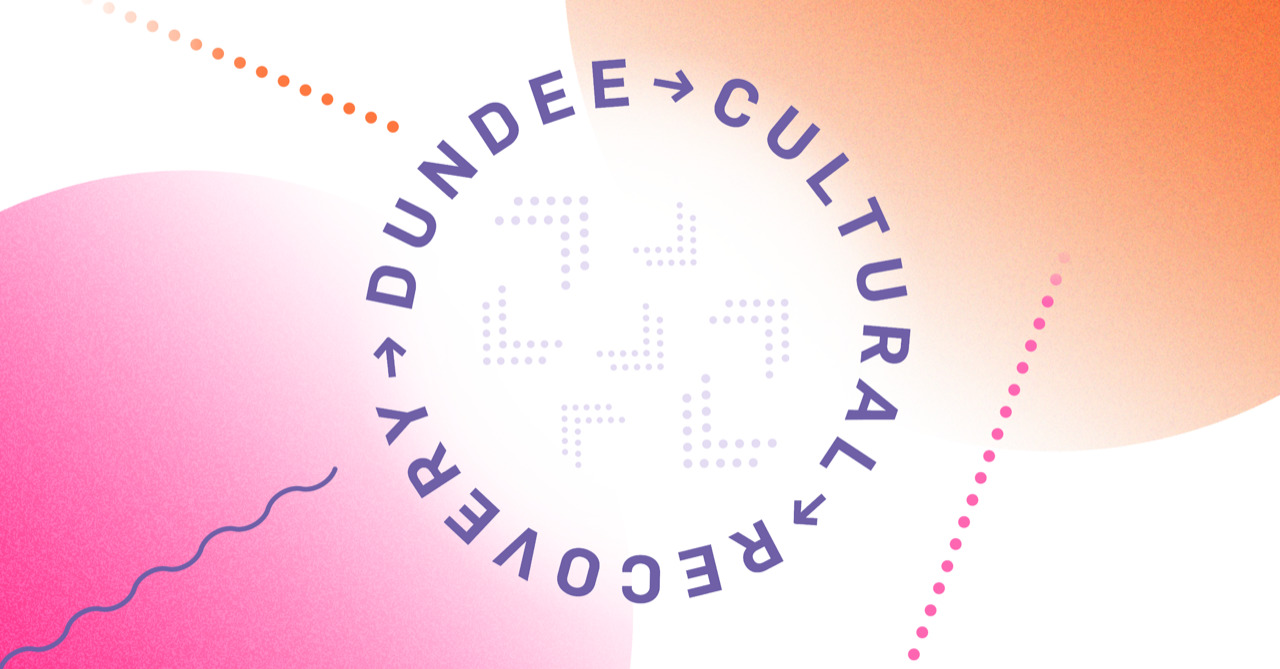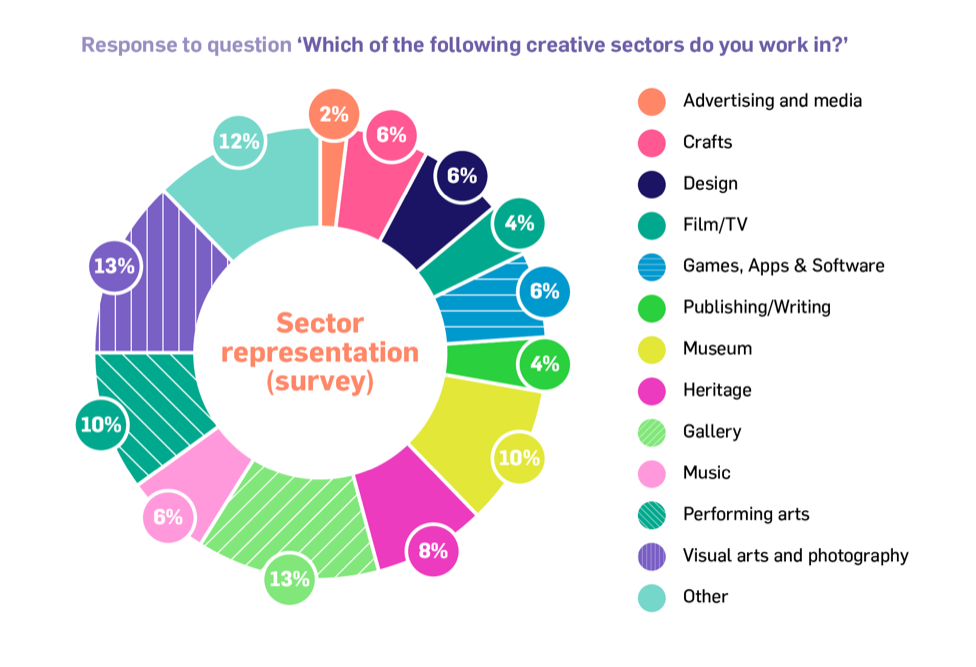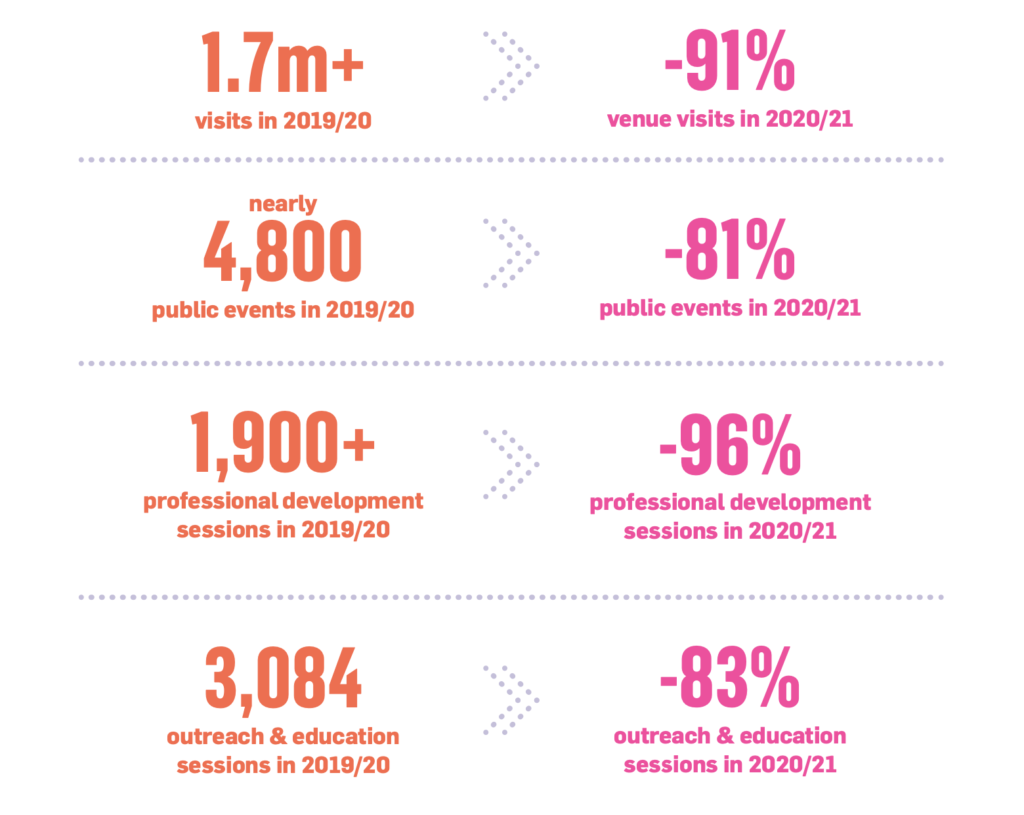
07.12.21
Since the first reports on the impact of the Covid-19 pandemic on creative and cultural industries emerged in 2020, there has been an incredible drive to both understand the varied impacts on different sectors and stakeholders, but also to use the Covid-19 crisis as a moment of reflection and opportunity to drive change.
In particular, the pandemic has exacerbated social inequalities and intensified the precarious nature of creative employment. Stark differences have also emerged in industries, organisations and individuals’ abilities to sustain work and generate income during the pandemic. The precarious conditions of creative employment, although well researched, nevertheless have a tendency to hide from public view, and only become visible in times of crisis.
It was with this in mind that I carried out the ‘Dundee Cultural Recovery’ research project, in collaboration with Leisure & Culture Dundee and Dundee City Council Events Team.
The main purpose of the project was to provide insights into the impact of the pandemic on the organisations and individual cultural workers (specifically freelancers) who make up Dundee’s cultural economy and the role of policy in supporting the city’s cultural recovery.
This included capturing the impact of Covid-19 on cultural organisations in Dundee, but also establishing a baseline for activity taking place across the city prior to the pandemic. The research also identified gaps for growth, support and development opportunities in order to support policy advocacy in connection with Dundee’s Covid Recovery Plan.
This blog focuses on the impacts and experiences of creative freelancers, but the wider project report also presents key findings on Workforce, Finance, Engagement and wider Covid impacts from a survey of cultural organisations in the city and focus groups and interviews with cultural sector stakeholders. It also shares core messages on cultural strategy development.

The greatest impact of the pandemic on creative freelancers was the sudden and often extensive loss of employment and income, particularly during the initial period when venues closed. The initial survey research found that, prior to the pandemic, a large proportion of the workforce across cultural organisations in Dundee were freelance/contract staff. Although total employment figures did not fall dramatically in the 2020/21 financial year, the number of employees in this group reduced by around a third.
This has obvious implications for the freelancers themselves, but a reduced freelancer workforce also hinders cultural organisations in delivering activities and events during the reopening and recovery period and beyond. It was discussed how freelancers were subsequently changing career paths or considering leaving the sector out of necessity. In turn, this damages the sector’s ability to contribute to wider economic and social development in the city.
For example, prior to the pandemic, education and outreach activities had been a prominent feature of cultural provision and engagement for both children and adults. Although some activity moved online and larger organisations developed new engagement activities, this was not possible for a lot of organisations and individuals. The dramatic fall in provision of education and outreach in 2020/21 also relates to the loss of employment experienced by creative freelancers for whom this had previously been considered a stable source of income. This is therefore a loss felt by organisations, freelancers and the local communities they work with.

There was a great desire for action and sense of a duty of care amongst the sector, both for employees, freelancers, members and their local communities. However, the high levels of uncertainty and economic pressure placed on cultural organisations and their leaders appeared to be reflected in their engagement with freelancers. In particular, negative relationships and contractual arrangements were reported with larger cultural organisations. While some organisations adapted their business models and developed programmes and funds to try and support creative freelancers, such initiatives did not always fairly value and compensate freelancers for their time and expertise, and therefore risked further engendering exploitative relationships.
Falling through the gaps in (national) financial support schemes and the impact this had on their livelihoods was another key feature of the discussion with creative freelancers. In this way, the pandemic was seen to exacerbate precarity and create further divisions between PAYE employees and freelance creative workers and between creative and non-creative workers. Further challenges and emotional distress were experienced in applying for limited sector-specific funding and hardship support, and a lack of understanding of creative industries business models beyond the sector made accessing wider financial support for business owners and the self-employed particularly challenging.
“the pandemic exacerbated the already precarious nature of freelance creative employment, requiring an even further diversification of activity.”
While acknowledging the dramatic and, in some cases, devastating impact of the Covid-19 crisis – on the cultural and creative industries and beyond – the Dundee Cultural Recovery Project and the final report also sought to highlight new possibilities and hold open space for hope for a more sustainable, inclusive recovery in Dundee.
The pandemic has highlighted the importance of cultural ecosystems, and the need for ecological approaches to understanding creative and cultural economies, policymaking and the recovery process. This means understanding the interrelationships and interdependencies between different actors and cultural resources (individuals, organisations, institutions, and governments) within an environment, and how it is these connections that generate cultural opportunity.
In Dundee, this could include connections between the city’s wealth of cultural resources such as galleries, museums, theatres, performance venues and other arts organisations, Leisure & Culture Dundee, Dundee City Council, educational institutions, creative networks (such as Dundee’s Cultural Agencies Network and Creative Dundee’s Amps network) and freelancers across the city, but also the local shopping centre, independent cafes, youth organisations, volunteer-run community groups and many more.
The Dundee Cultural Recovery project emphasised the interconnected nature of the impacts of the pandemic across the city and the actors within Dundee’s creative and cultural sector, but also the potential for support to be leveraged across the city’s existing networks. In the report, I argue that recognising the interdependent (ecological) nature of cultural opportunities and their development (for social, cultural and economic benefit) is vital for policy and practice to support a sustainable and inclusive recovery from and future adaptations to the Covid-19 pandemic.
The Dundee Cultural Recovery report presents three key recommendations for supporting sustainable and inclusive recovery practices and policies in connection with the city’s cultural strategy and the recovery plan.
“Dundee has potential to innovate and become an exemplar by fostering the city’s capacity for ideas generation and practices of care among its highly collaborative community and taking advantage of its goldilocks scale.”
Overall, I present that an ecological approach to the Covid-19 recovery is needed in Dundee, including developing strategic linkages between different policy areas and development agendas connected with the local plan. Strong leadership which considers this ecology and is attentive to the power dynamics within it is crucial to a sustainable recovery. With such an approach, Dundee has potential to innovate and become an exemplar by fostering the city’s capacity for ideas generation and practices of care among its highly collaborative community and taking advantage of its goldilocks scale.
Acknowledgements
The research built on the work of the Cultural Development Group of the Dundee Partnership and findings from the report are directly feeding into the Covid Recovery Plan being developed by the Cultural Development Group.
The Dundee Cultural Recovery project was a collaboration between Duncan of Jordanstone College of Art & Design at the University of Dundee, Leisure & Culture Dundee and Dundee City Council Events Team. The research was led by Dr Lauren England while a Baxter Fellow in Creative Economies at the University of Dundee and supported by an Impact and Innovation Development Fund (2021) from the University of Dundee. With the support of Culture Counts, the report was designed by Jamie Stein, a freelance graphic designer based in Dundee.
Author bio
Dr Lauren England is a Lecturer in Creative Economies at King’s College London, UK. In 2020-21, while conducting this research, she was a Baxter Fellow in Creative Economies at Duncan of Jordanstone College of Art & Design at the University of Dundee, UK. Dr England is interested in creative enterprise and education with a focus on craft and design economies and sustainable development in both global North and global South contexts. She has published research on the craft economies, creative economy development in Africa and the impact of COVID-19 on creative workers. She is currently researching the impact of COVID-19 on creative economies.

If you would like to support us in creating even better content, please consider joining or supporting our Amps Community.